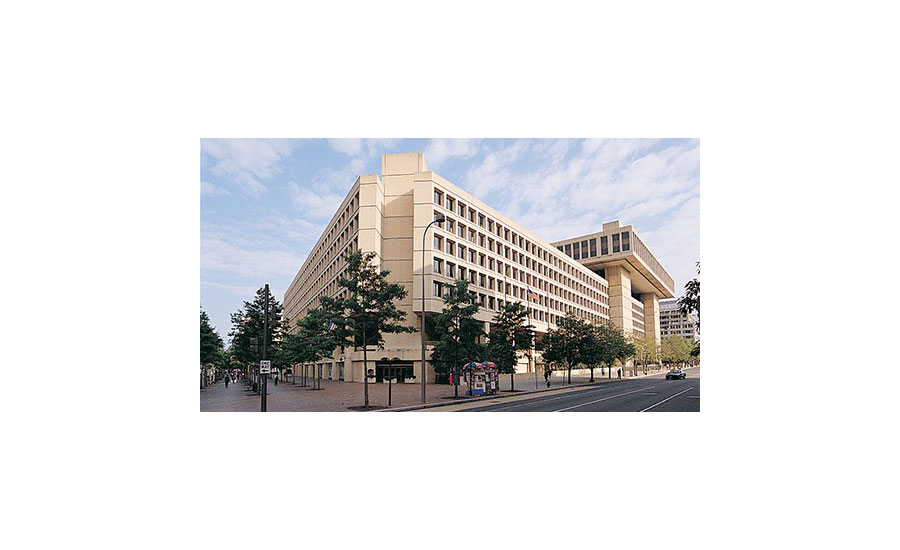Federal Buildings
Administration Seeks To Build New FBI HQ on Current D.C. Site

Agencies say current building has "failing" concrete and systems past service lives.
Photo courtesy of Federal Bureau of Investigation
A Senate committee plans to examine a new $3.3-billion Trump administration proposal to demolish the Federal Bureau of Investigation's worn, outmoded headquarters in downtown Washington, D.C., and construct a new facility on that site.
The proposal, outlined in a Feb. 12 U.S. General Services Administration-FBI report to the Senate Environment and Public Works Committee, also includes moving about 2,300 of the FBI's 10,600 workers to bureau facilities in Alabama, Idaho and West Virginia.
This plan, which follows a 2017 announcement that the agencies were dropping earlier plans to build an FBI headquarters campus in D.C.'s Maryland and Virginia suburbs. The decisions have sparked strong criticism from the Maryland and Virginia congressional delegations and now will be scrutinized in the Senate and House.
A spokesman for the Senate committee said via email that the panel "will evaluate the proposal's recommendations" at a Feb. 28 hearing, at which it will receive testimony from GSA and the FBI.
For the project to move forward, the committee and its House counterpart would have to approve the new plan and appropriations committees would have to fund it.
According to the agencies' report, the new proposal calls for a 2.6-million-sq-ft new building at an estimated cost of $3.3 billion, including $1.9 billion for design and construction and $479 million for office space to house FBI workers while construction is underway.
GSA and the FBI state that the administration would seek about $2.2 billion in appropriations toward the envisioned project. They say a contract could be awarded in 2019 and the facility occupied in 2025.
Last July, in a move that surprised congressional lawmakers, the administration said it was abandoning an earlier proposal in which a to-be-chosen developer would build a new FBI facility of more than 2 million sq ft in the D.C. suburbs.
In exchange, the developer would get rights to construct other facilities on the site of the bureau's current 44-year-old J. Edgar Hoover Building. Its location is prime real estate on Pennsylvania Avenue between the White House and the U.S. Capitol.
That earlier plan, which originated more than a decade ago, had advanced in 2014 to a short list of three sites—two in Prince George's Co., Md., and one in Springfield, Va. No developer had yet been selected.
But last year, the Trump administration said that plan is dead. One reason for abandoning the developer plan, officials said, was that congressional appropriations for the project were $882 million short of a cost that the Obama administration had estimated at $1.4 billion.
The Feb. 12 GSA-FBI report now pegs the cost of the earlier suburban concept at $3.6 billion, or about $237 million more than their preferred new alternative.
During a hearing last August, in the wake of the news that the developer swap concept had been canceled, Senate committee Chairman John Barrasso (R-Wyo.) elicited a promise from GSA and the FBI to come up with a new plan by last Nov. 30.
The agencies later asked for a 60-day extension. Barrasso and the committee's top Democrat, Tom Carper (Del.), wrote back to the two agencies, granting the request for the extra time but also spelling out what they wanted to see in the report.
GSA and the FBI missed that extended deadline—something Barrasso called "unacceptable"—and finally delivered the report about two weeks late.
Hill Critics
Barrasso hasn't yet commented on the report or the agencies' new proposal. But the members of the Maryland and Virginia congressional delegations blasted the GSA-FBI plan.
The most recent criticisms came at a Feb. 15 House government operations subcommittee hearing. The panel's ranking Democrat, Gerry Connolly (Va.), declared that the GSA-FBI's changed plans represent "a body blow to public confidence in the federal government's ability to manage a building procurement on the scale of the proposed FBI headquarters."
Connolly added, "The federal government comes off as unreliable and whimsical at best."
Sen. Ben Cardin (D-Md.) said that it is "incomprehensible" how GSA decided to propose the new plan.
Cardin, who is on the Environment and Public Works panel, said in a statement, "To put forward a proposal that has a higher cost for less consolidation and is inconsistent with congressional authorization is bizarre—perhaps more bizarre than GSA's original decision to cancel the previous procurement."
Sen. Mark Warner (D-Va.) called the GSA decision "deeply disappointing." He added, "It raises serious questions that GSA would ignore its previous careful consideration and forgo the millions of dollars already spent in the search to relocate the Bureau."
Most of the critiques have come from Democrats in the D.C. region. But House panel Chairman Mark Meadows (R-N.C.) also has weighed in. He said at the Feb. 15 hearing that he doesn't intend to let the FBI matter rest. "This is a bipartisan issue," Meadows said.
He added that he doesn't agree with the GSA-FBI proposal. "I can be convinced," he told the panel of GSA witnesses. But he added that, based on the information GSA was presenting, "I am not convinced."
Crumbling Facade
There is wide agreement, however, that that the Hoover building is inadequate.
The GSA-FBI report states that pieces of the facility's exterior and interior concrete are "failing" and its infrastructure "is on a path to catastrophic failure with key building systems past their expected service lives."
In a statement, GSA said of the current headquarters, "Crumbling facades, aging infrastructure, physical, structural and security limitations in the degraded facility all are severely impeding the FBI's ability to meet its critical law enforcement and national security missions."
It added, "The work of the FBI requires a modern and secure headquarters with technology and equipment to support the men and women of the FBI who are dedicated to keeping our country safe."
Correction: Story updated on 2/21. A House subcommittee, not the full Oversight and Government Reform Committee, held the Feb. 15 hearing. Rep. Meadows chairs the subcommittee.



